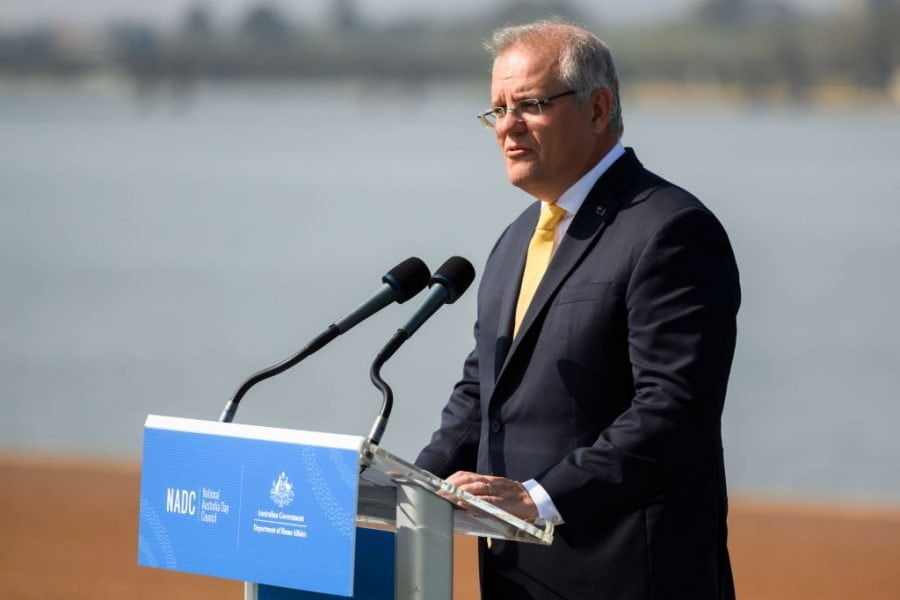From Jacobin
Australia’s “Sovereign Borders”
When elected in 2018, Australia’s current prime minister Scott Morrison brought to his Canberra office a trophy shaped like an Asian fishing boat, emblazoned with the words “I Stopped These.” It is a self-congratulatory reminder of Morrison’s role as Immigration Minister for Abbott’s conservative government in forging “Operation Sovereign Borders” — a policy credited with eliminating asylum seeker arrivals by sea to Australia. Beginning as an election mantra for Abbott’s Liberal party in 2013, the operation aimed to “stop the boats” that had brought some thirty-eight thousand asylum seekers to Australia since 2009.
The military-led strategy rested on two core components: so-called “tow-backs” and offshore detention. The former tasked the Australian Defence Force with identifying and returning asylum seeker vessels to their point of departure, normally Indonesia. This included buying and deploying vessels (such as orange lifeboats) to turn back unseaworthy boats, as well as instances of paying Indonesian people-smugglers to deliver the same ends.
“Regional processing” — policy speak for offshore detention — meanwhile saw arrivals bound for Australia transferred to centers on Nauru or Papua New Guinea’s Manus Island, where their claims would be assessed pending resettlement. (The misnomer “processing” was readily apparent by 2016: the average duration in immigration detention stood at four hundred fifty days, with a quarter of asylum seekers spending more than seven hundred fifty days behind bars.)

Rohan Thomson / Getty
The policy has since seen more than four thousand asylum seekers, including children, transported to Manus and Nauru, where many have waited more than five years for the outcome of their claims. At least a dozen have died in detention, including through acts of suicide such as self-immolation. Other deaths have been documented resulting from turn-back operations.
There have been countless instances of abuse by security guards, violence, self-harm, and physical and psychological illness (mostly untreated) resulting from the dire material and social conditions at both Manus and Nauru.
As well as routinely violating the international law of non-refoulment — that refugees should not be returned to a place of danger — Australia’s policy has been found to breach a catalogue of other human rights, including acts of torture against children, as one United Nations’ report concluded.
The Abbott and Morrison leaderships cannot alone credit themselves with this record. The principles enshrined in Operation Sovereign Borders date back to 2001, when Liberal PM John Howard instated the “Pacific Solution” to intercept and detain arrivals offshore in neighboring states.
The same year, more than three hundred fifty asylum seekers — almost half of them children — drowned when their fishing boat sank in international waters south of Indonesia where the Australian navy was conducting extensive patrol operations at the time. No official inquiry was held to determine why the vessel had not been detected, or why it took three days for the news to come to light — yet neither of Australia’s two major parties hesitated to use the event as political capital in promoting a harsher border policy on the pretext of ending deaths at sea.
And a decade before this, it was the Labor government of Paul Keating that lay the ideological foundations of Australia’s border regime. The law of mandatory detention obliged all “unauthorized arrivals” to be locked up, regardless of age or circumstance. The detention facilities — mostly outsourced to multinational private security and prison contractors — were characteristically isolated desert sites, materially deprived and wrought with misconduct, abuse, frequent hunger strikes, riots, suicide (including attempts by children), and other forms of self-harm.
Australia’s punitive trajectory was, however, garlanded by the Abbott government with the addition of the policy that any asylum seeker reaching Australia by boat would never be settled within its borders. A concurrent $20 million offshore advertising campaign was launched under the banner, “No way. You will not make Australia home.” (Or as former PM Malcolm Turnbull later declared, “even if we think you are the best person in the world, even if you are a Nobel Prize–winning genius, we will not let you in.”)
The Australian government has since invested an estimated $573,000 per year in detaining each individual offshore, with the system regularly costing more than $1 billion annually. With few exceptions, these policies have gone unchallenged in parliament, receiving bipartisan support among leaders of successive governments and oppositions.
Leave a Reply
You must be logged in to post a comment.